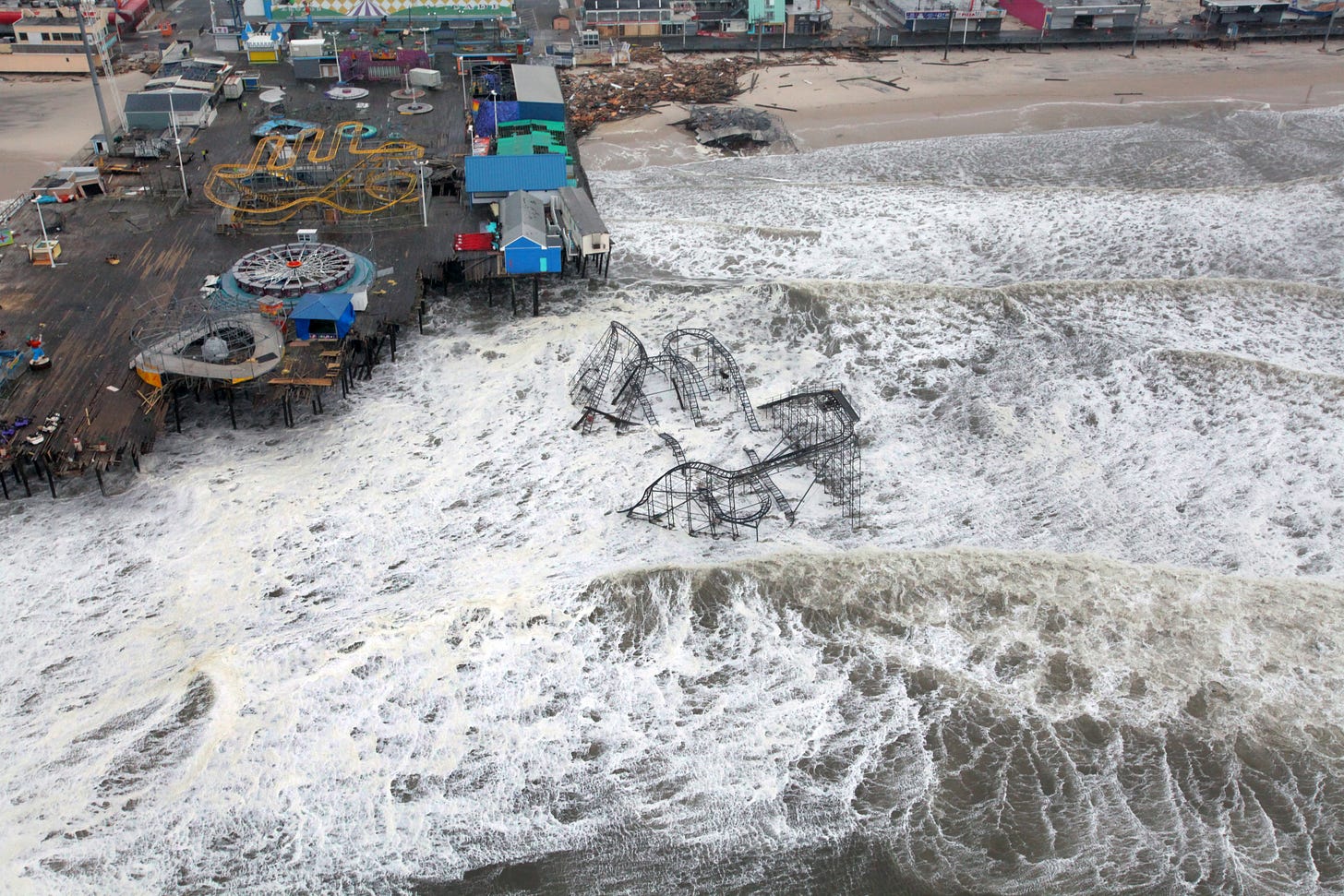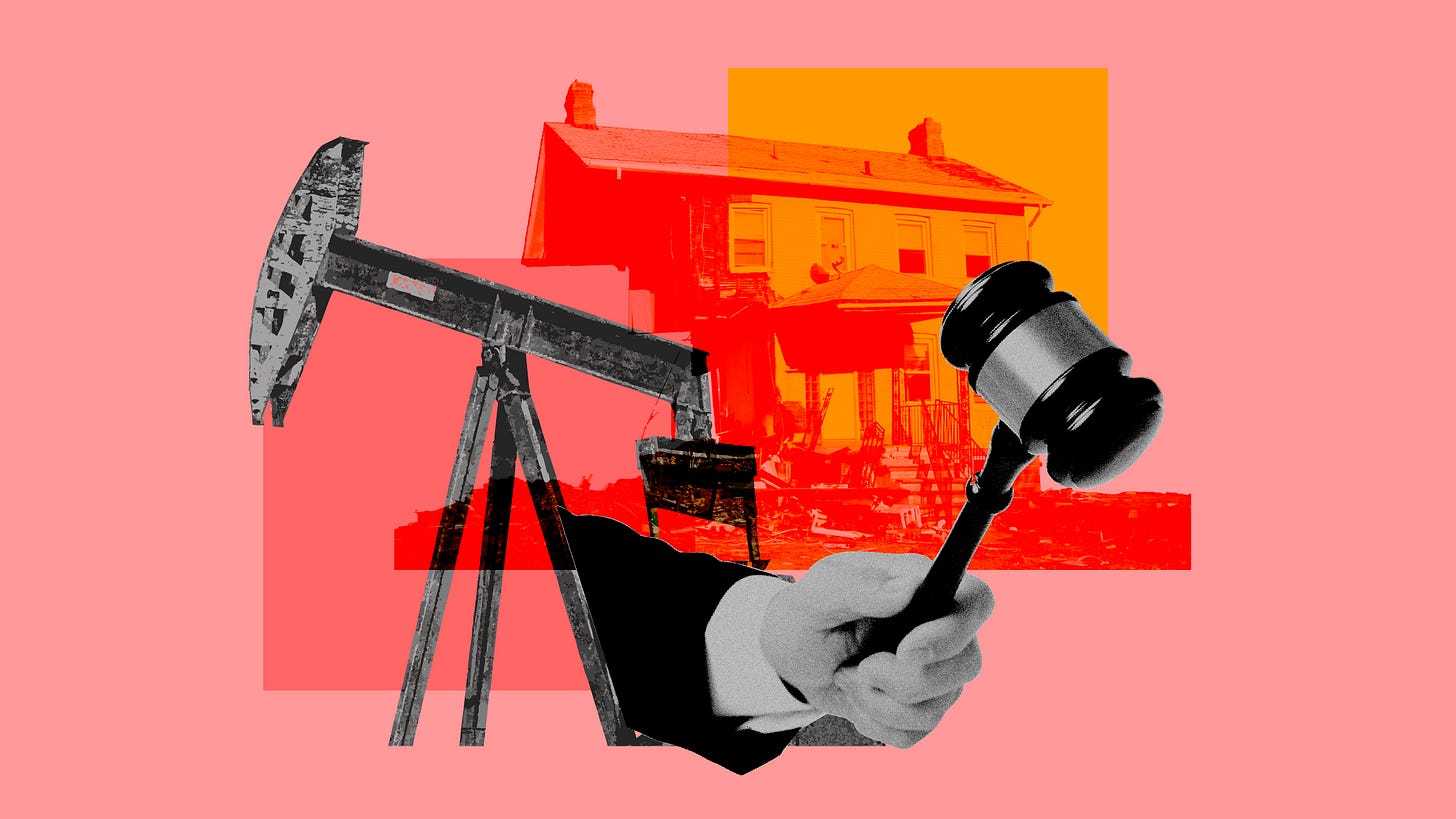State judges side with Big Oil, teeing up appeals fights
“These judges have drunk the Kool Aid that the oil companies are selling,” one law professor said.
A New Jersey judge this week dismissed the state’s climate deception lawsuit against oil and gas companies, becoming the fourth judge in six months to side with Big Oil in such cases. As similar lawsuits creep closer toward trial, state and local governments are vowing to fight these latest rulings, which grapple with a central question still being deliberated among judges: what are these lawsuits about, and what are they trying to achieve?
The state and local officials filing lawsuits against oil and gas majors argue that they are seeking to hold the companies accountable under state laws for misleading the public about the dangers of fossil fuels — and in some cases, make them help pay for the resulting damage that alleged deception caused to communities, including from worsening climate disasters like wildfires, hurricanes, heatwaves, and floods.
New Jersey’s complaint said oil companies’ “successful climate deception campaign had the purpose and effect of inflating and sustaining the market for fossil fuels,” accelerating climate change and leading to disasters like Superstorm Sandy, which caused $30 billion in property damage and resulted in 38 deaths in New Jersey alone. The case asks the court to force ExxonMobil, Chevron, Shell, BP, ConocoPhillips, and the American Petroleum Institute to stop spreading disinformation about their operations and help New Jersey communities fortify their infrastructure against future climate threats.
New Jersey Superior Court Judge Douglas Hurd, however, rejected that framing in his ruling against New Jersey, writing that “Despite the artful pleading by the Plaintiffs in this case, this court finds that Plaintiffs’ complaint, even under the most indulgent reading, is entirely about addressing the injuries of global climate change and seeking damages for such alleged injuries.”
That characterization of the cases is the same one put forward by oil companies. Fossil fuel defendants have contested the grounds of the lawsuits entirely, arguing that climate change is an issue for the federal government, and that the cases attempt to control emissions and are therefore preempted under federal law, including the Clean Air Act.
The New Jersey ruling comes after two Maryland judges dismissed cases filed against Big Oil by Baltimore, and Annapolis and Anne Arundel County, respectively, similarly finding that they seek to regulate greenhouse gas emissions through the courts, and are therefore preempted by federal law.
“What’s happening is the oil companies have convinced these state court judges that these lawsuits are not what the states say they are,” said Pat Parenteau, an environmental law professor and senior fellow at Vermont Law School. “These judges have drunk the Kool Aid that the oil companies are selling.”
Now, plaintiffs are fighting to make their theory of the lawsuits clear and get them back on track. Baltimore filed the opening brief in an appeal of its dismissal last month, and New Jersey’s attorney general pledged to do the same “immediately.”
Judges ruling on other communities’ cases previously have rejected the industry’s preemption arguments and allowed those cases to move forward. In December, the U.S. Supreme Court declined to review a Hawai‘i Supreme Court ruling that paves the way for Honolulu’s case against Big Oil to “move more quickly to trial.”
Next week, the Colorado Supreme Court will hear ExxonMobil’s appeal of a lower court ruling that the climate deception lawsuit from the City and County of Boulder Colorado was not preempted by federal law and could proceed toward trial. “The energy companies are arguing against a case the local governments did not plead,” that Colorado court found.
“A preemption virus”
In his dismissal of New Jersey’s case, Judge Hurd wrote that “Fundamental principles of federalism in the United States Constitution are clear that state law cannot operate in areas of ‘uniquely federal interests,’” referring to disputes about “interstate and international emissions.”
Parenteau said he believes the judge misinterpreted New Jersey’s claims — which fall under state laws like public nuisance and consumer protection — along with prior rulings and existing legal doctrine. The ruling cited the Maryland court decisions, which also ruled that the cases are preempted by federal law.
“The analysis in these decisions is paper thin,” Parenteau said. “It’s like a preemption virus is going around.”
Robert Percival, a law professor and director of the University of Maryland’s environmental law program, agreed that the series of dismissals seemed to accept the oil industry’s characterizations of the cases as having ulterior motives to “control greenhouse gas emissions all over the world.”
“That’s simply not true,” he said. “In none of these cases are the plaintiffs asking the court to do anything to order reductions of emissions.”
“I think what you've got here is lazy judges wanting to avoid a complicated trial that actually looks at the truth or falsity of these allegations and instead just say, ‘let's just get rid of these cases,’” Percival said.
The threat against climate lawsuits is coming from outside the courtroom, too. A recently introduced Maryland bill would prohibit state and local governments from “filing an action for monetary damages or alleged economic damages against a business for the adverse effects of global warming or climate change in the State.”
New Jersey’s attorney general, Matthew Platkin, said the dismissal of his state’s case was “inconsistent with decisions in other states, and we are appealing immediately.”
“We will not let companies get away with putting profit above public safety,” he added.

NYC’s greenwashing claims
Last month, another climate lawsuit — brought by New York City under the city’s consumer protection law — was dismissed on different grounds. The judge in that case found that “the City has not sufficiently pled that Defendants’ alleged greenwashing campaigns, involving statements about clean energy and alternative energy sources, are ‘made in connection with the sale’ of a consumer good.” In other words, according to the judge, the city’s complaint relied on oil companies’ advertising campaigns aimed at boosting their reputation through potentially misleading statements about their commitments to clean energy — rather than advertising that deceived the public about a specific product for sale.
Rebecca Tushnet, a First Amendment professor at Harvard Law School, said components of that ruling were “contestible,” and clearly specific to language in New York’s law. “Marketing experts will tell you that what often sells products is basically reputation,” she said. “The judge said, ‘Sure, but the law that New York City is suing under doesn't allow for that.’”
The ruling also argued that climate-conscious consumers can’t be misled by oil companies’ false advertising. “The City cannot have it both ways by, on one hand, asserting that consumers are aware of and commercially sensitive to the fact that fossil fuels cause climate change, and, on the other hand, that the same consumers are being duped by Defendants’ failure to disclose that their fossil fuel products emit greenhouse gases that contribute to climate change,” the judge wrote.
Tushnet contested that notion. “Reasonable consumers could certainly think, ‘oh, this is a less bad form, right? I'm doing less damage if I choose this particular product,’ when that might not be true,” she said. “We live in an imperfect world, so people do try and minimize their damage.”
Tushnet said she would expect the city to appeal, and the decision should have little effect on other consumer fraud cases, since each will be determined by state and local laws.
Separate climate consumer fraud cases brought by Vermont and Massachusetts’ attorneys general — which also seek to make companies pay for violating state consumer protection laws and cease fraudulent marketing — have already overcome oil defendants’ motions to dismiss, and are moving toward trial (subject to a potential appeal of Vermont’s ruling by the companies).
What’s next
The Colorado Supreme Court arguments in Boulder’s case next week will mark the second time a state Supreme Court has weighed in on oil companies’ preemption arguments. Its eventual ruling could carry more significance now amid mixed decisions from lower state courts.
Michael Gerrard, director of the Sabin Center for Climate Change Law at Columbia University, pointed out that just two climate deception cases — in Massachusetts and Hawai‘i — have received rulings from a state Supreme Court so far, both of which “prevailed on the legal issues.”
“Trials are ahead in both cases,” Gerrard said. “The other decisions are all from lower courts, and they are all likely to be appealed. It's too early to tell how they will turn out when they get to the state Supreme Courts.”
If the preemption dispute continues among states, the U.S. Supreme Court may have more motivation to step in, especially if there is a split in opinion among state supreme courts. Ted Boutrous, who is defending Chevron on behalf of law firm Gibson Dunn, said in a statement that "These types of claims are precluded and preempted by federal law and must be dismissed under clear U.S. Supreme Court precedent.”
Ultimately, Percival pointed out, none of the dismissals thus far have actually weighed in on any evidence of wrongdoing or violations committed by oil companies.
“Stay tuned,” he said. “The companies will fight everything, and we'll see how the individual cases come out, particularly when they go to trial.”

